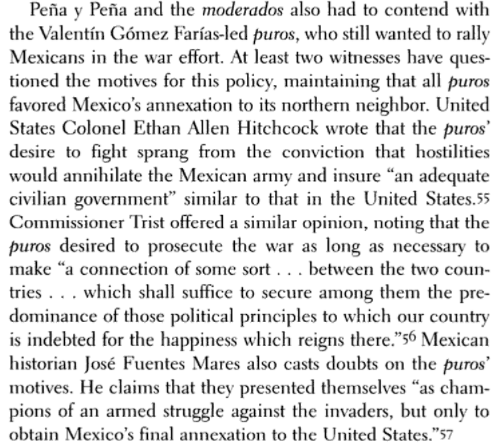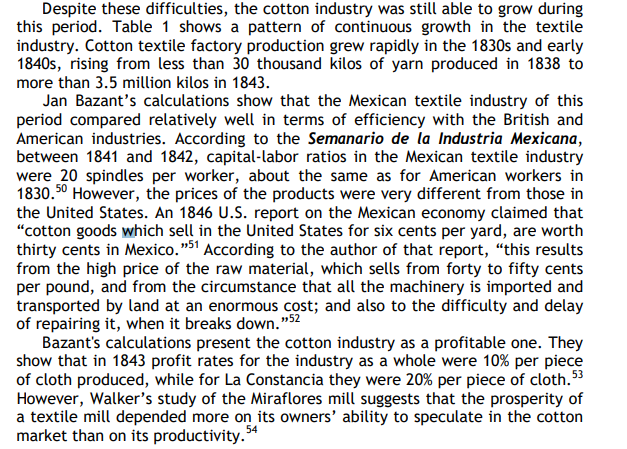History Learner
Well-known member
Vice President George Dallas, Secretary of the Treasury Robert Walker, and Secretary of State James Buchanan were all in favor of All Mexico. More importantly, perhaps, is that a large and growing faction in the Senate, increasingly dominant in the Northern states and having split the South, was also in favor of annexing Mexico:
The Slavery Question and the Movement to Acquire Mexico, 1846-1848 by John D. P. Fuller, The Mississippi Valley Historical Review Vol. 21, No. 1 (Jun., 1934), pp. 31-48:
I'd also include The United States and Mexico, 1847-1848 by Edward G. Bourne in the The American Historical Review, Vol. 5, No. 3 (Apr., 1900), pp. 491-502 as he largely came to the same conclusions as this aforementioned work did.
The issue of race is also rather overblown, I think, as the situation at the time was far different than currently thought of. The media at the time propagated the idea of romance between American men and Mexican women as a means of assimilating the Mexicans, even going as far as to write poetry on such. These sentiments did not stop at rhetoric, however, as such inter-marriages were actually common in the parts of the Mexican cession that had existing, sufficiently large populations and were, apparently, considered respectable. Essentially, everyone outside of Calhoun's Pro-Slavery faction didn't really care and it was pretty well understood Calhoun's stance was born out of fears of additional free states entering the Union as opposed to his rhetorical concerns of a threat to the WASP ruling elite of the United States.
As far as Mexican sentiment on the issue, the Federalists, one of the two major Pre-War factions in Mexico, were in favor of annexation:

Winfield Scott also suggested this in his own correspondence:
The United States Army in Mexico City, by Edward S. Wallace (Military Affairs, Vol. 13, No. 3 (Autumn, 1949), pp. 158-166) also states a desire for annexation among the well off of Mexico City, and goes into detail about the relationships cultivated between American soldiers and Mexican civilians.
So, the PoD is Nicholas Trist being among the many Americans to die to Yellow Fever in late 1847 in Mexico. By the time a replacement is sent, the Pro-Annexationist crowd is in the majority and the we end up with Mexico in it's entirety being absorbed by the United States sometime in 1848. No insurgency pans out, as most Mexicans prove indifferent or even in favor of this change in political circumstances.
The Slavery Question and the Movement to Acquire Mexico, 1846-1848 by John D. P. Fuller, The Mississippi Valley Historical Review Vol. 21, No. 1 (Jun., 1934), pp. 31-48:
In the Congress which assembled in December, 1847, the question of the acquisition of all Mexico appeared in the open for the first time. Among those who may definitely be numbered with the expansionists were Senators Dickinson and Dix of New York, Hannegan of Indiana, Cass of Michigan, Allen of Ohio, Breese and Douglas, of Illinois, Atchison of Missouri, Foote and Davis of Mississippi, and Houston and Rusk of Texas. The leadership in the fight, against imperialism fell not to the anti-slavery element but to pro-slavery Democrats. On December 15, Calhoun in the Senate and Holmes in the House introduced resolutions opposing the acquisition of Mexico. Other pro-slavery Democrats, Butler of South Carolina, and Meade and Hunter of Virginia, also registered their opposition.
Further:In the Congress which assembled in December, 1847, the question of the acquisition of all Mexico appeared in the open for the first time. Among those who may definitely be numbered with the expansionists were Senators Dickinson and Dix of New York, Hannegan of Indiana, Cass of Michigan, Allen of Ohio, Breese and Douglas, of Illinois, Atchison of Missouri, Foote and Davis of Mississippi, and Houston and Rusk of Texas. The leadership in the fight, against imperialism fell not to the anti-slavery element but to pro-slavery Democrats. On December 15, Calhoun in the Senate and Holmes in the House introduced resolutions opposing the acquisition of Mexico. Other pro-slavery Democrats, Butler of South Carolina, and Meade and Hunter of Virginia, also registered their opposition.
Between October, 1847, and the following February the theme of the story underwent considerable alteration. By the latter date, as noted above, the National Era was advocating the absorption of Mexico, insisting that it would be free territory, and citing along with other evidence, Calhoun's opposition to annexation as proof that the anti-slavery interests had nothing to fear from extensive territorial acquisitions. In other words, the National Era was convinced that if there had been a "pro-slavery conspiracy" to acquire all Mexico, it could not realize its ends even though the whole country were annexed. This conviction seems to have come largely as a result of the propaganda, which was streaming from the northern expansionist press and the opposition of Calhoun.The editor probably reasoned that since Calhoun was opposing absorption the expansionists at the North must be correct. If the main body of the anti-slavery forces could be converted to this point of view, the movement for absorption which was growing rapidly at the time would doubtless become very strong indeed.
Care should be taken not to exaggerate the anti-slavery sentiment for all Mexico. It is evident that some such sentiment did exist, but there was not sufficient time for it to develop to significant proportions. The Treaty of Guadalupe-Hidalgo had already been signed in Mexico when the National Era took up the cry of all Mexico with or without the Wilmot Proviso. In a short while the war was over and whatever anti-slavery sentiment there was for all Mexico collapsed along with the general expansion movement. Had the war continued several months longer it is not improbable that increasing numbers from the anti-slavery camp would have joined forces with those who were demanding the acquisition of Mexico. Their action would have been based on the assumption that they were undermining the position of the pro slavery forces. It was, not to be expected that those abolitionists, and there were undoubtedly some, who were using the bogey of "extension of slavery" to cover up other reasons for opposition to annexation, would have ever become convinced of the error of their ways. They would hold on to their pet theory to the bitter end.
To summarize briefly what seem to be the conclusions to be drawn from this study, it might be said that the chief support for the absorption of Mexico came from the North and West and from those whose pro-slavery or anti-slavery bias was not a prime consideration. In quarters where the attitude toward slavery was all-important there was, contrary to the accepted view, a "pro-slavery conspiracy" to prevent the acquisition of all Mexico and the beginnings of an "anti-slavery conspiracy" to secure all the territory in the Southwest that happened to be available. Behind both these movements was a belief that expansion would prove injurious to the slavery interest. Had the war continued much longer the two movements, would probably have developed strength and have become more easily discernible. Lack of time for expansionist sentiment to develop was the chief cause of this country's, failure to annex Mexico in 1848. Even as it was, however, there might have been sufficient demand for annexation in February and March, 1848, to have wrecked the Treaty of Guadalupe-Hidalgo had it not been for the opposition of pro-slavery Democrats led by Calhoun. Their attitude divided the party committed to expansion in the presence of a unified opposition. Whatever the motives which may be attributed to Calhoun and his friends, the fact remains that those who feel that the absorption of Mexico in 1848 would have meant permanent injury to the best interests of the United States, should be extremely grateful to those slaveholders. To them not a little credit is due for the fact that Mexico is to-day an independent nation.
I'd also include The United States and Mexico, 1847-1848 by Edward G. Bourne in the The American Historical Review, Vol. 5, No. 3 (Apr., 1900), pp. 491-502 as he largely came to the same conclusions as this aforementioned work did.
The issue of race is also rather overblown, I think, as the situation at the time was far different than currently thought of. The media at the time propagated the idea of romance between American men and Mexican women as a means of assimilating the Mexicans, even going as far as to write poetry on such. These sentiments did not stop at rhetoric, however, as such inter-marriages were actually common in the parts of the Mexican cession that had existing, sufficiently large populations and were, apparently, considered respectable. Essentially, everyone outside of Calhoun's Pro-Slavery faction didn't really care and it was pretty well understood Calhoun's stance was born out of fears of additional free states entering the Union as opposed to his rhetorical concerns of a threat to the WASP ruling elite of the United States.
As far as Mexican sentiment on the issue, the Federalists, one of the two major Pre-War factions in Mexico, were in favor of annexation:

Winfield Scott also suggested this in his own correspondence:
[34] However, two years later, after the treaty of peace was signed at Guadaloupe on Feb. 2, 1848, and sixteen days later, after he was superceded in the command of the army by Butler, he could write, "Two fifths of the Mexican population, including more than half of the Congress, were desirous of annexation to the US, and, as a stepping stone, wished to make me president ad interim.'"
The United States Army in Mexico City, by Edward S. Wallace (Military Affairs, Vol. 13, No. 3 (Autumn, 1949), pp. 158-166) also states a desire for annexation among the well off of Mexico City, and goes into detail about the relationships cultivated between American soldiers and Mexican civilians.
So, the PoD is Nicholas Trist being among the many Americans to die to Yellow Fever in late 1847 in Mexico. By the time a replacement is sent, the Pro-Annexationist crowd is in the majority and the we end up with Mexico in it's entirety being absorbed by the United States sometime in 1848. No insurgency pans out, as most Mexicans prove indifferent or even in favor of this change in political circumstances.



